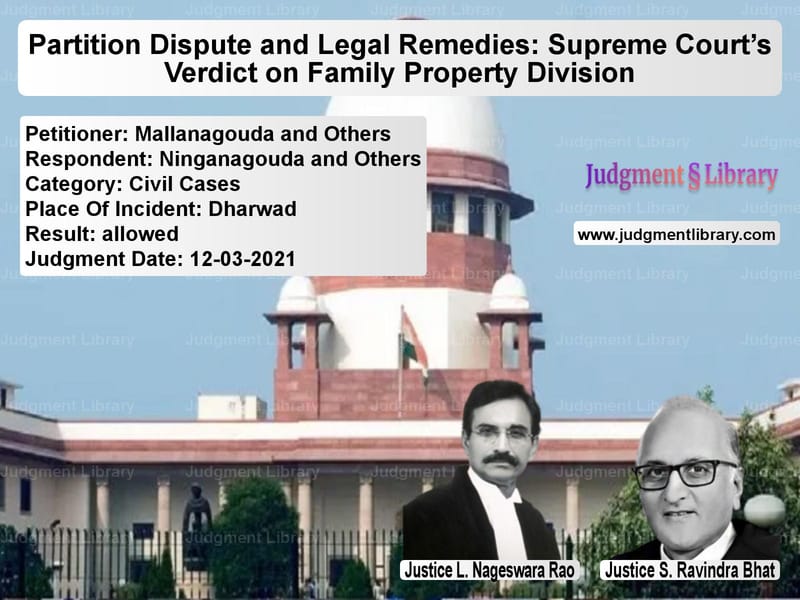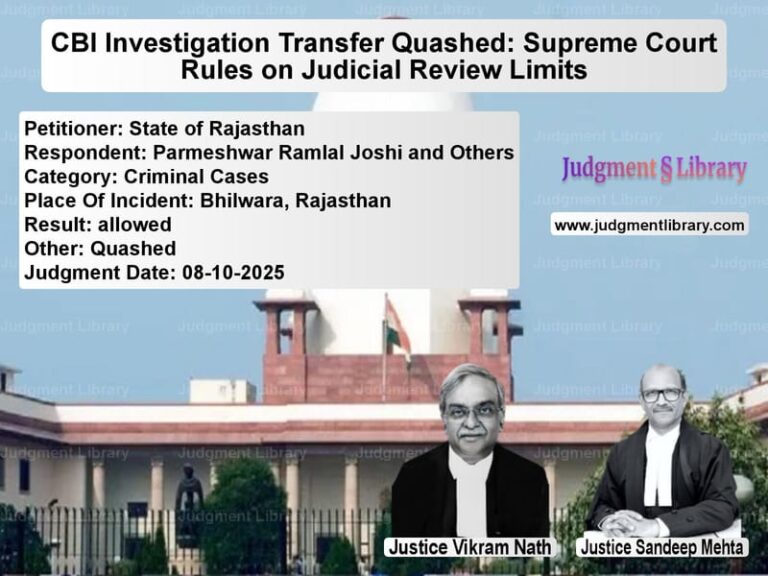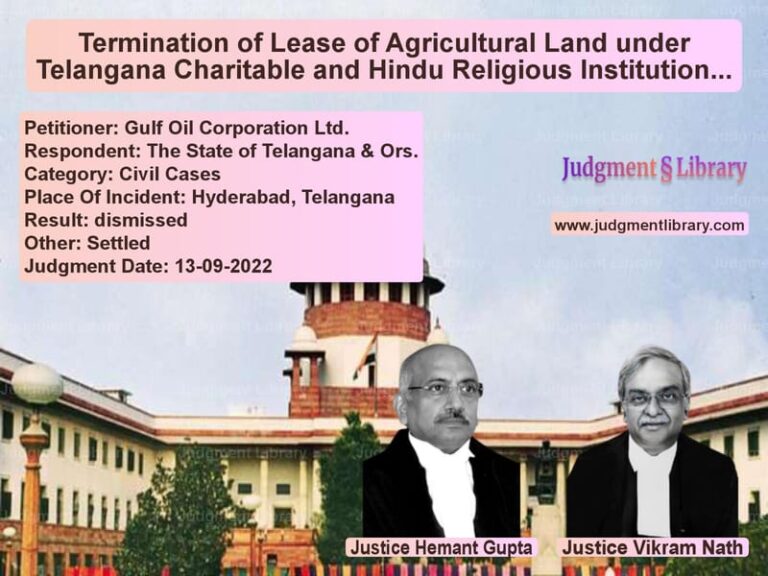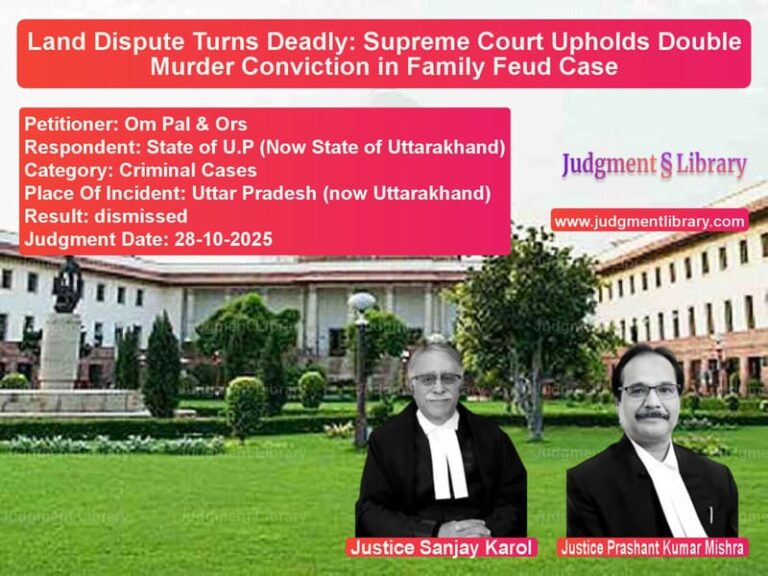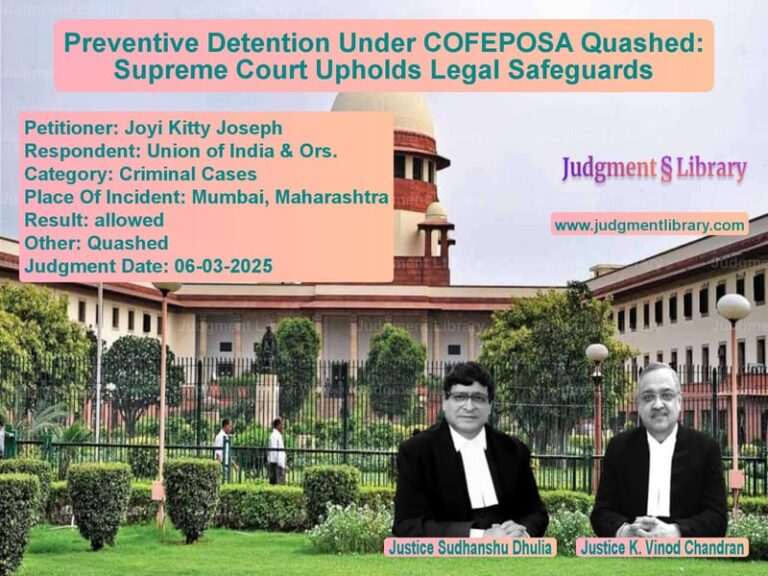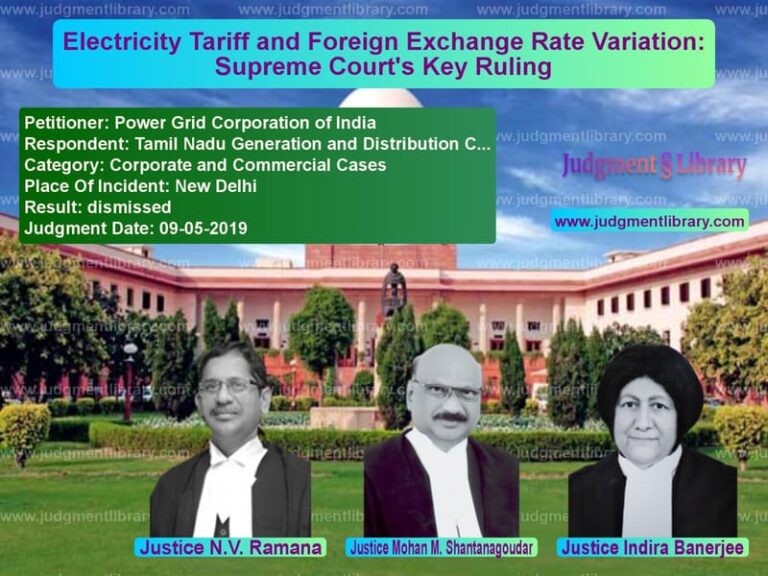Partition Dispute and Legal Remedies: Supreme Court’s Verdict on Family Property Division
The case of Mallanagouda and Others vs. Ninganagouda and Others revolves around a long-standing family dispute over the partition and allocation of ancestral property. The deceased, Ranganagouda Patil, initiated a suit seeking partition and separate possession of the joint family properties. His father, Veeranagouda Channappagouda Patil, had passed away intestate in 1981. A series of legal battles ensued, culminating in the Supreme Court’s decision to uphold the First Appellate Court’s judgment and set aside the High Court’s ruling.
Background of the Case
The primary issue in this case was whether the plaintiff, Ranganagouda Patil, was entitled to a share of the family property. The defendants argued that a partition had already taken place during the lifetime of their father, Veeranagouda. They contended that Ranganagouda had received monetary compensation in lieu of his share and had started living separately.
The Third Additional Civil Judge, Dharwad, partially decreed the suit on 16.11.2002, granting the plaintiff a 1/8th share of the suit properties, with separate inquiries into mesne profits. The trial court appointed a commissioner to partition the properties. The plaintiff was granted his rightful share, but objections raised by the defendants were rejected. The Final Decree Petition was decided on 28.11.2012, confirming the plaintiff’s entitlement to 8 acres, 13 guntas in Block No.5, along with mesne profits.
Appeals and High Court’s Decision
The defendants challenged the final decree, leading to the matter being reviewed by the Second Additional District Judge. On 07.08.2015, the First Appellate Court upheld the trial court’s decision, except concerning Schedule D property. However, when the matter reached the High Court, it overturned the earlier decisions and remanded the case back to the trial court, instructing it to reconsider the allocation of shares in Block No.5.
The High Court justified its intervention on the grounds that the land in Block No.5 had non-agricultural potentiality. It reasoned that the plaintiff’s allotment would cause serious prejudice to the defendants, as the property was adjacent to a busy road. The High Court ruled that the land should be reallocated among all claimants fairly.
Arguments of the Parties
Petitioners’ Arguments:
- The High Court overstepped its jurisdiction under Section 100 CPC.
- The First Appellate Court was the final court on factual matters, and its findings should not have been disturbed.
- The High Court ignored evidence on record and interfered without substantial legal grounds.
Senior Counsel Mr. Basava Prabhu Patil argued, “The High Court exceeded its jurisdiction by reversing the judgment of the First Appellate Court on facts contrary to the evidence on record.”
Respondents’ Arguments:
- Partition should not disproportionately benefit one party.
- The land in Block No.5 was strategically located and had greater commercial value.
- The High Court’s judgment ensured fair distribution.
Counsel Mr. S.N. Bhat emphasized, “Partition of properties should not be lopsided, benefiting only one party.”
Supreme Court’s Verdict
The Supreme Court set aside the High Court’s ruling, reaffirming the First Appellate Court’s decision. It observed that the High Court’s intervention was unwarranted since no substantial question of law was raised under Section 100 CPC.
The Supreme Court stated, “The First Appellate Court is the final court on facts. It has been repeatedly held that its judgment should not be interfered with unless there is a substantial question of law.”
The Court also noted that the High Court had failed to provide any valid justification for altering the First Appellate Court’s conclusions. The claim that Block No.5 had non-agricultural potentiality had been dismissed earlier due to the defendants’ failure to present the necessary evidence at the appropriate stage.
Final Judgment
The Supreme Court ruled in favor of the appellants, affirming the final decree passed by the trial court and upheld by the First Appellate Court. The High Court’s judgment was set aside, and the appeal was allowed. The court emphasized the prolonged nature of the litigation and the need for finality in the matter.
The judgment concluded, “The final decree passed by the trial court, to the extent affirmed by the First Appellate Court, is upheld. The judgment of the High Court is set aside. The appeal is allowed accordingly.”
Petitioner Name: Mallanagouda and Others.Respondent Name: Ninganagouda and Others.Judgment By: Justice L. Nageswara Rao, Justice S. Ravindra Bhat.Place Of Incident: Dharwad.Judgment Date: 12-03-2021.
Don’t miss out on the full details! Download the complete judgment in PDF format below and gain valuable insights instantly!
Download Judgment: mallanagouda-and-oth-vs-ninganagouda-and-oth-supreme-court-of-india-judgment-dated-12-03-2021.pdf
Directly Download Judgment: Directly download this Judgment
See all petitions in Property Disputes
See all petitions in Succession and Wills
See all petitions in Landlord-Tenant Disputes
See all petitions in Specific Performance
See all petitions in Damages and Compensation
See all petitions in Judgment by L. Nageswara Rao
See all petitions in Judgment by S Ravindra Bhat
See all petitions in allowed
See all petitions in supreme court of India judgments March 2021
See all petitions in 2021 judgments
See all posts in Civil Cases Category
See all allowed petitions in Civil Cases Category
See all Dismissed petitions in Civil Cases Category
See all partially allowed petitions in Civil Cases Category

